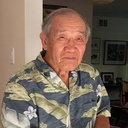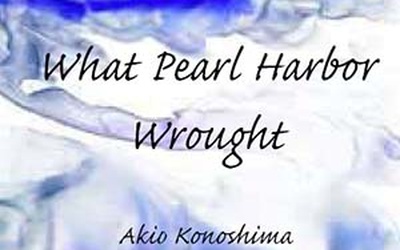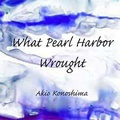
Akio Konoshima
@akilidaBorn in Tokyo on Jan. 5, 1924, Akio Konoshima arrived in the United States on June 23 of that year, about a week before the effective date of the Oriental Exclusion Act. He grew up on raspberry and truck garden farms outside of what is now the heart of “Silicon Valley.” During WWII, he was at Santa Anita and then Heart Mountain, rejected by the Army because, as an Issei, he remained classified as an “enemy alien.” Since the end of the war, he graduated from the University of Wisconsin, studied Japanese at the Army Language School, served in Japan and Korea, then attended graduate school to study Japan and the Far East at Columbia University.
Konoshima retired in 1995 after having worked, among other positions, as a press secretary for the late Senator Hiram Fong and an information specialist at the Occupational Safety and Health Administration. He has three grown children and four grandchildren. Now he resides with his wife, a Shanghai-born Chinese American. He is comfortably retired, being babied and scolded while living, reading the newspapers and wondering where America and the rest of the world are going now.
Updated October 2010
Stories from This Author
Epilogue
Nov. 16, 2010 • Akio Konoshima
Life: …the sequence of physical and mental experiences that make up the existence of an individual…from Webster’s New Collegiate Dictionary. Father would have liked the simple ceremony at the cemetery where his ashes were being interred. The group was small: just family and a few friends. Jo’s father was 92 years old when he died; his mother had passed away a short year and a half before. None of his father’s personal friends were there, all having already died or …
A Soldier is a Soldier - Part 5
Oct. 29, 2010 • Akio Konoshima
As he sat alone, Jo scanned the room. In the dim light of the room's lone bulb, he could see a scroll with Chinese calligraphy in the room's alcove with the Japanese word "Manzoku -- fulfillment." A rural work scene was painted on the screen which partitioned the room; the house's rough-hewn center beam -- more than a foot and a half square -- was covered with a dark stain, maybe from the soot of the open fire in the …
A Soldier is a Soldier - Part 4
Oct. 22, 2010 • Akio Konoshima
The hon-ke (family home) stood on a rise at the start of a small vale. In the twilight, Jo could make out rice paddies; flat rows of vines, probably yams; hedgelike rows of tea plants; and low fruit trees on the side. Close up, the house seemed much larger than it had when he and Isamu saw it from the river ferry. The thatched roof was about two feet thick. In spots where the mortar had chipped off of the …
A Soldier is a Soldier - Part 3
Oct. 15, 2010 • Akio Konoshima
The flat wooden deck of the river ferry was small. Jo, his duffle bag and small back pack, and Isamu and his mo-ped, took up a third of the deck space. Two steel cables, anchored on both banks of the river, straddled the ferry while a third was attached to a two-cylinder motor, which popped and smoked as it was revved up. The ferryman, in an old pair of denim coveralls and wearing a conical straw hat, could have been …
A Soldier is a Soldier - Part 2
Oct. 8, 2010 • Akio Konoshima
Two hours later -- the road's ascent seemed endless -- the bus finally moved into a small valley. To one side, narrow-gauged railway cars, which looked like toys when compared to the freight cars at home, stood intermixed with flat-bottom gondolas, some stacked with lumber, others empty. In a far corner lay twisted rails, other debris, and the stubbed remains of a steel radio transmission tower. However, no signs of the war could be seen as the bus moved through …
A Soldier is a Soldier - Part 1
Oct. 1, 2010 • Akio Konoshima
June 25, 1950: North Korea invades South Korea. The United States was convinced that the Korean War made an early peace treaty with Japan imperative…President Truman announced in mid-September, 1950, that the United States intended to begin informal discussions with the Allies on the question. (Hugh Borton, Japan’s Modern Century.) Jo studied the other passengers on the bus. Could any of them be a relative? The farm woman in baggy, unbleached denim workpants, a pin-striped blue blouse and a graying …
Flo - Part 3
Sept. 13, 2010 • Akio Konoshima
It was not until the initial block meeting was ending that Jo noticed Flo and Hideo at one of the front tables, talking to Flo's two brothers and people Jo didn't recognize. Jo could not hear what they were saying, but he could see the shaking of heads and animated hand gestures. More block meetings, again often late into the night, followed. Though Jo had made up his own mind, the turmoil among his friends continued as they agonized over …
Flo - Part 2
Sept. 6, 2010 • Akio Konoshima
The winter of 1942-43 at Heart Mountain was severe, or maybe all winters there were that severe. At 20 degrees or so below zero moisture would freeze on the hair in Jo’s nostrils when he breathed in. That Christmas brought the first deep snow—about a foot—that Jo was to experience. If anything, though, the winter harshness seemed to have made the romance between Flo and her boy friend that much cozier. Jo noticed, for instance, that while walking outside in …
Flo - Part 1
Aug. 30, 2010 • Akio Konoshima
January 29, 1943: A War Department press release announces the registration program for both recruitment for military service and leave clearance. February 6, 1943: Army teams were scheduled to visit the 10-WRA administered camps…to register all male nisei of draft age. Each had to complete a special questionnaire, designed to test their “loyalty” and willingness to serve in the armed forces. Had things gone as they normally would have (if anything about camp living could be called normal) Flo probably …



